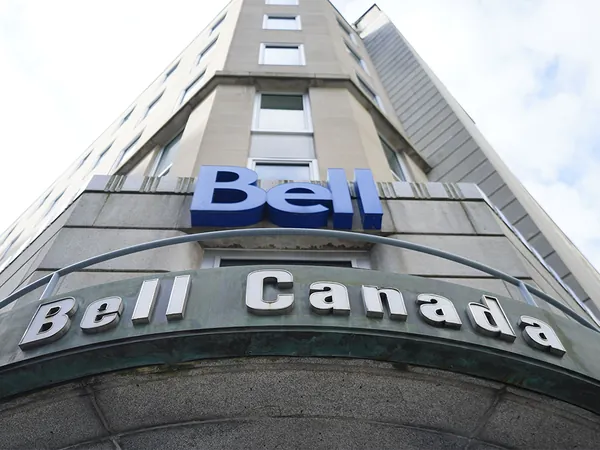
BCE Shares Plunge to 11-Year Low Amid Ambitious U.S. Expansion and Dividend Freeze
2024-11-04
Author: Emily
BCE's Bold Move into the U.S. Market
BCE Inc., Canada's telecommunications giant, has taken a bold step into the U.S. market with its recent acquisition of Northwest Fiber LLC, better known as Ziply Fiber, in a deal valued at $5 billion. This strategic move aims to capture faster growth in the underserved Pacific Northwest, currently covering 1.3 million locations across Washington, Oregon, Idaho, and Montana, with ambitions to expand to over three million in the next four years.
Impact on BCE's Shares
However, this ambitious acquisition has sent BCE's shares tumbling to an 11-year low, closing at $41.52 in Toronto—a staggering drop of 7.3%. The last time the stock was this low was in August 2013. Analysts were quick to voice their concerns, especially following the company's announcement that it would pause dividend increases, leaving investors worried about the prospective returns from the telecom sector.
Financing the Acquisition
To finance the acquisition, BCE is relying significantly on the proceeds from the sale of its stake in Maple Leaf Sports & Entertainment Ltd. (MLSE), which owns iconic franchises like the Toronto Maple Leafs and Toronto Raptors. In a transaction announced last month to Rogers Communications Inc., BCE's strategy seeks to exchange a minority stake in a prominent sports asset for a venture more aligned with its core telecommunications business, as expressed by CEO Mirko Bibic.
Skepticism Among Analysts
This transaction is a bold approach to growth, anchored to what we do best in a business we know really well,” Bibic stated, implying that the move could bring desirable diversification to the company. However, this shift has led to skepticism from financial analysts like Maher Yaghi of Scotia Capital, who described the acquisition as a 'perplexing transaction' at a hefty price tag of over 14 times the expected earnings. He further emphasized that investors traditionally focus on dividends rather than growth in the Canadian telecom market, raising doubts about the acquisition's potential impact on BCE's cash flow.
Challenges Ahead
Adding to the challenges facing BCE is the current high yield of its dividends, which exceeds nine percent, coupled with pressures from a slowing wireless market and significant capital expenditures. The company has invested heavily in developing its fiber optic network, striving to enhance its competitive edge against other rivals like Rogers and Quebecor Inc.'s Videotron.
Future Outlook
Interestingly, despite the anticipated benefits of expanding their fiber network to over 12 million locations in North America by 2028, BCE's management has indicated their net debt leverage ratio will remain relatively stable, leading investors to question the long-term sustainability of their strategies.
As BCE embarks on this ambitious journey into the U.S. telecom landscape, all eyes will be watching closely to see if the potential for growth can outweigh the immediate financial discomfort reflected in its stock price and dividend policies. Could this be the beginning of a new chapter in BCE's history or a risky gamble that puts its financial integrity on the line? Only time will tell.









 Brasil (PT)
Brasil (PT)
 Canada (EN)
Canada (EN)
 Chile (ES)
Chile (ES)
 España (ES)
España (ES)
 France (FR)
France (FR)
 Hong Kong (EN)
Hong Kong (EN)
 Italia (IT)
Italia (IT)
 日本 (JA)
日本 (JA)
 Magyarország (HU)
Magyarország (HU)
 Norge (NO)
Norge (NO)
 Polska (PL)
Polska (PL)
 Schweiz (DE)
Schweiz (DE)
 Singapore (EN)
Singapore (EN)
 Sverige (SV)
Sverige (SV)
 Suomi (FI)
Suomi (FI)
 Türkiye (TR)
Türkiye (TR)